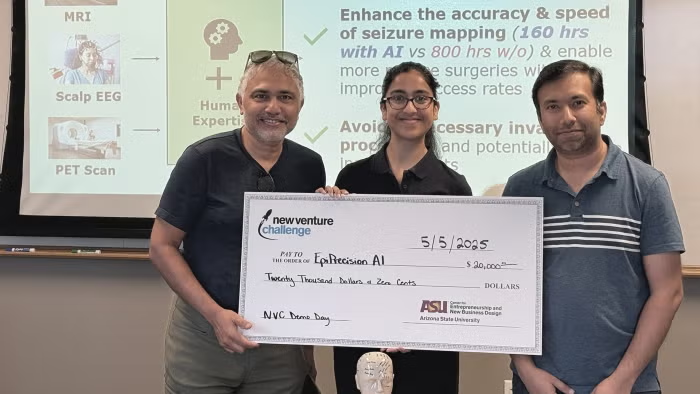A groundbreaking new venture, EpiPrecision AI, stemming from research at Arizona State University (ASU), is poised to transform the treatment landscape for drug-resistant epilepsy. The startup, born out of a collaboration between the W.P. Carey School of Business and the Ira A. Fulton Schools of Engineering, recently secured a $20,000 award from the ASU Center for Entrepreneurship and New Business Design’s New Venture Challenge to accelerate its commercialization.
Epilepsy affects 50 million people globally, with approximately 20 million experiencing drug-resistant seizures that significantly impair quality of life and increase health risks. For these patients, surgery is often the most effective treatment, yet it remains drastically underutilized due to the complex and costly challenges in accurately identifying surgical candidates and mapping seizure onset zones.
EpiPrecision AI directly addresses these hurdles. The platform integrates diverse medical data, including MRI, PET scans, and scalp EEGs, with a sophisticated artificial intelligence (AI) model enhanced by expert medical knowledge. This hybrid approach drastically improves the speed and accuracy of seizure mapping, reducing analysis time from an average of 800 hours to just 160 hours. This efficiency enables more timely and precise surgical interventions.
“I believe in doing something that makes an impact,” stated Shraddha Mittal, an MBA student at the W.P. Carey School of Business and a driving force behind EpiPrecision AI. “If we can use AI to make the most viable treatment options more affordable and accessible for drug-resistant epilepsy patients who are desperate to become seizure-free, that would be game-changing for all stakeholders.”
Research conducted by the EpiPrecision AI team, in collaboration with a leading children’s hospital and drawing on data from 352 patients, demonstrated the profound impact of this augmented intelligence model. While AI alone achieved 65% accuracy in mapping seizure onset zones, combining it with physician expertise boosted accuracy to an impressive 89%, significantly outperforming either method in isolation.

Professor Sandeep Gupta of the Fulton Schools’ IMPACT Lab, who mentored the team, emphasized the criticality of this synergistic approach. “It’s essential that these assistive systems are trustworthy,” noted Associate Research Professor Ayan Banerjee of the IMPACT Lab. “A good combination of medical learning and machine learning will create reliable new technology.”
EpiPrecision AI projects substantial benefits for both healthcare providers and patients. The technology aims to raise epilepsy surgery success rates to nearly 100%, dramatically improving patient outcomes. Hospitals utilizing EpiPrecision AI could see up to a 40% reduction in treatment costs and a threefold increase in the number of surgeries performed annually, enhancing both cost efficiency and revenue. Furthermore, by streamlining diagnostics and reducing costs, the platform has the potential to expand access to life-saving surgery for patients in underserved regions with limited specialized expertise.
The venture is strategically positioned at the intersection of the rapidly expanding $613 billion health AI market and the $26 billion medical imaging AI sector, with digital health technologies in neurology alone projected to reach $303 billion by 2034. This convergence of critical medical need, advanced technology, and significant market opportunity underscores EpiPrecision AI’s immense commercial and societal promise.
Mittal will now spearhead efforts to leverage the ASU funding to explore startup company options and engage with investors, capitalizing on the entrepreneurial foundation established through the New Venture Challenge. “It’s crucial that we learn to speak the investor’s language,” Mittal added. “We are very passionate about this research, but we have to make sure that message gets through to the people who can help us bring this technology to market.”
EpiPrecision AI exemplifies the power of thoughtfully applied artificial intelligence to transcend the limitations of traditional medicine, offering a beacon of hope to millions suffering from drug-resistant epilepsy and charting a course for future AI-driven interventions in neurology and beyond.












